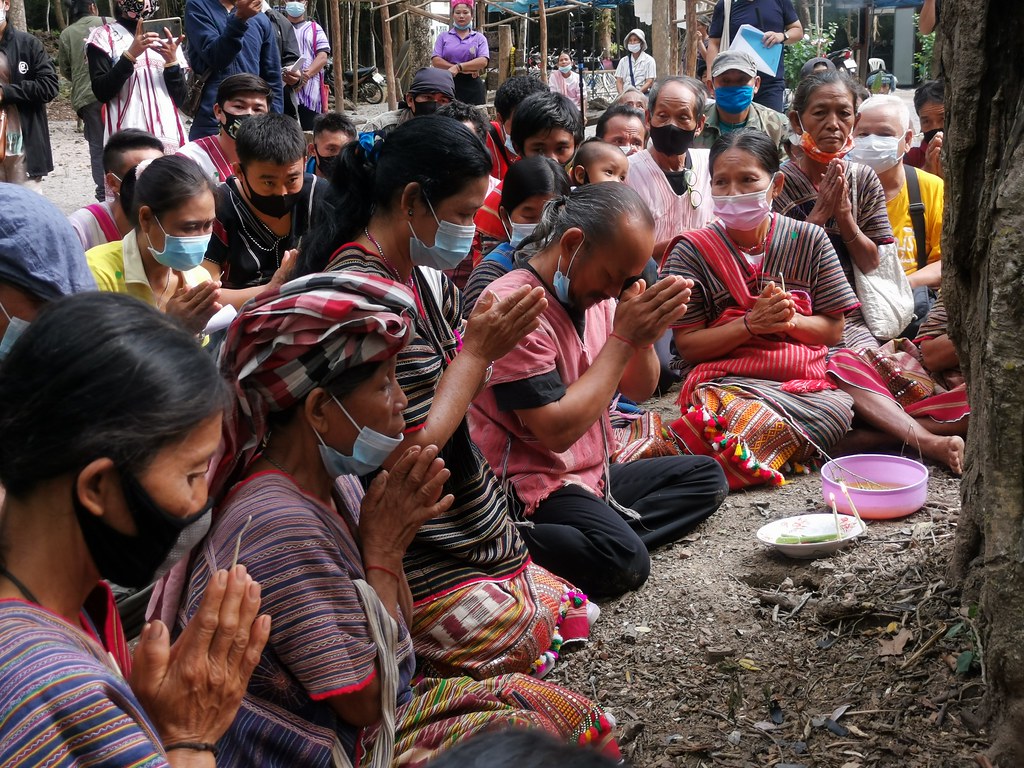Thailand’s nomination of the Kaeng Krachan Forest Complex for World Heritage status should once again be deferred due to concerns about violations of the rights of local indigenous communities, says the International Union for Conservation of Nature (IUCN).

One of the representatives of civil society organizations who went to the UN headquarters in Bangkok in January 2021 to submit a petition for the protection of indigenous community members from Bang Kloi who returned to their ancestral land in the Kaeng Krachan forest stood in front of the UN office holding a banner saying "No rights, no world heritage site."
UNESCO published last Monday (21 June) an addendum to the 2020 and 2021 IUCN World Heritage Evaluations, ahead of the 44th session of the World Heritage Committee, which is planned to take place on 16 – 31 July 2021 in Fuzhou, China.
The report stated that the IUCN, as an advisory body to the World Heritage Committee, recommended that the World Heritage Committee defer Kaeng Krachan’s nomination back to the Thai government to allow it to resolve concerns regarding community rights and ensure that the nomination is supported by all affected indigenous peoples and local communities.
The IUCN also recommends that the Thai government “work closely, and in full consultation” with affected communities and the Special Procedures Branch of the Office of the United Nations High Commissioner for Human Rights (UNOHCHR) to resolve human rights issues affecting indigenous and local communities in the area. The government should also establish “an independent, third-party, arbitration process” together with UNESCO and UNOHCHR to address the local communities’ concerns and to respond effectively to the eventual recommendations of that process, prior to proceeding further with the nomination.”
The Thai government previously nominated the Kang Krachan Forest Complex as a natural world heritage site three times, in 2015, 2016, and 2019. All three times, the World Heritage Committee referred the nomination back to the Thai government in order to allow it to resolve rights and livelihoods concerns relating to the Karen communities in the area and to reach a consensus of support for the nomination.
The Kaeng Krachan Forest Complex covers 482,225 hectares of forest in Phetchaburi, Ratchaburi, and Prachuap Kiri Khan, and includes four conservation areas in Thailand’s western region: the Kaeng Krachan National Park, the Kui Buri National Park, the Chaloem Phrakiat Thai Prachan National Park, and the Mae Nam Phachi Wildlife Sanctuary.
The forest complex area also includes several villages, both in the conservation zone and in nearby areas, which contain over 5000 households. Many members of these communities have faced and are still facing legal prosecution as the authorities claim they have encroached on forest land. They are also being denied civil rights and are facing racial discrimination, with many community members still unable to get Thai citizenship and denied access to basic welfare, while community rights defenders face harassment and legal prosecution. Meanwhile, the investigation into the disappearance of community rights defender Porlajee “Billy” Rakchongcharoen, who went missing in 2014 and whose bones were found in May 2019, seems to have come to a standstill. The communities have raised concerns that if the forest attained World Heritage status, it would worsen these issues.

Members of the communities holding a traditional ceremony to inform the spirits that an event is being held ahead of a gathering on 16 December 2020, where members of the indigenous Karen communities living in the areas surrounding the Kaeng Krachan Forest Complex came to speak about unresolved community rights issues.
In January 2021, more than 80 members of the Bang Kloi Karen indigenous community travelled into the Kaeng Krachan forest to return to their former villages at Bang Kloi Bon and Chai Phaen Din, from where they were forcibly evacuated in 1996 and 2011, due to ongoing community rights issues and loss of employment due to the Covid-19 pandemic. They were later forcibly evicted from the forest and arrested by park officials, police, and military officers, who charged them with encroaching on national park land.
22 of the community members were detained at Khao Kling Prison for 2 days before being granted temporarily release by the Phetchaburi Provincial Court on the condition that they do not return to the area in which they were arrested or enter other national park areas without permission.
Thailand, along with 143 other countries, is a signatory to the United Nations Declaration on the Rights of Indigenous Peoples (UNDRIP), which states that indigenous peoples “have the right to participate in decision-making in matters which would affect their rights” and that states should “consult and cooperate in good faith with the indigenous peoples concerned […] in order to obtain their free, prior and informed consent before adopting and implementing legislative or administrative measures that may affect them.”


